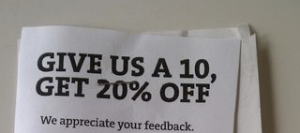Gaming the customer experience measurement system: why?
The credibility of customer experience is at risk from employees who game the measurement system. They are motivated to play the system because their performance management reviews depend on it. We can dismiss it as a by-product of the organisation’s ‘culture’ but cultures are made up of people and people allow it to happen – especially when everything is about the number and not why the number is what it is.
Where employees feel compelled to make things look better than they really are, bad commercial decisions will be made or good ones will be deferred, based on what is effectively false evidence.
It’s a crucial issue but one that is often hidden behind the internal rhetoric that proclaims “We put customers first”. Unfortunately there are many examples of gaming the customer measurement system and here are just some of those I’ve come across in recent times. They show that if the focus is on a headline number and not the qualitative insight, the competitive advantage and lower costs the measurement is supposed to generate will never materialise:
- The leadership team believed they had good employee engagement because the scores in the survey said so. However, in one-to-one conversations with the team on on the floor, employees said it was a dreadful place to work. Some would rather tell friends they were unemployed than say who they worked for. But when the survey came round, they ticked the top box because they thought (incorrectly as it turned out) that a high score for the company was a key metric in determining whether or not they had a bonus at the end of the year.
- Contact centre agents asked customers for a Net Promoter Score (NPS) on the basis that “A score of between zero and three is atrocious, between four and eight is not very good and a nine or a ten is good”.
- A car retailer couldn’t work out why revenues were down but advocacy scores were high. Because they were incentivised to have high NPS results, franchises followed up purchases with a courtesy call and request for a net promoter score. Customers were actively encouraged to give a top score, in return for which they would get a discount off a service or tyres. And when customers booked a car in for subsequent services, they took the initiative and demanded the lower price in return for giving higher scores.
- A large multi-brand, multi-channel organisation announced internally that any salary rise at the end of the year was conditional on a increase in customer scores. Immediately, behaviours changed. There were requests to the reporting team to remove scores from certain journeys because they weren’t good, to change the weighting of different elements making up the overall score and complaints were received from customers who were put under pressure to increase the scores they had already given.
- Stressed and insecure managers, looking to give their bosses what they want to see, tell their team “This is the story I want to tell, go and find the evidence”. Meanwhile, the reality of what is happening to customers conveniently goes unreported.
There will be more, but I would urge you to reflect on your measurement system – if it could be manipulated, how might that be and how can I find out? Are your findings and influencing skills exposed to a challenge from the board about their credibility? And so on. But the bigger question has to be “Why?”. What is it about the way the company treats and rewards its people that is effectively weakening decision-making, costing more and handing the advantage to competitors?
I spend my working life advising organisations that they should not chase the number. It’s important but it’s not the end-game. Measure the right things, understand what it’s telling you and change what needs changing; but never chase the number for the sake of it. It drives all the wrong behaviours and causes more harm than good. My mantra : Get the experiences right and the number will look after itself.
If you’ve heard about examples of how the numbers can be manipulated and how that then affects decision-making, please share your thoughts!
If you’d like to know more about measuring the right customer experiences or how I might be able to help with any other aspect of customer experience do please get in touch – I’m on +44 (0) 7917 718 072 or email [email protected]. 
Thank you, I hope you found the post interesting and thought-provoking, and please feel free to add your own views below.
Jerry Angrave

Leave a Reply
Want to join the discussion?Feel free to contribute!